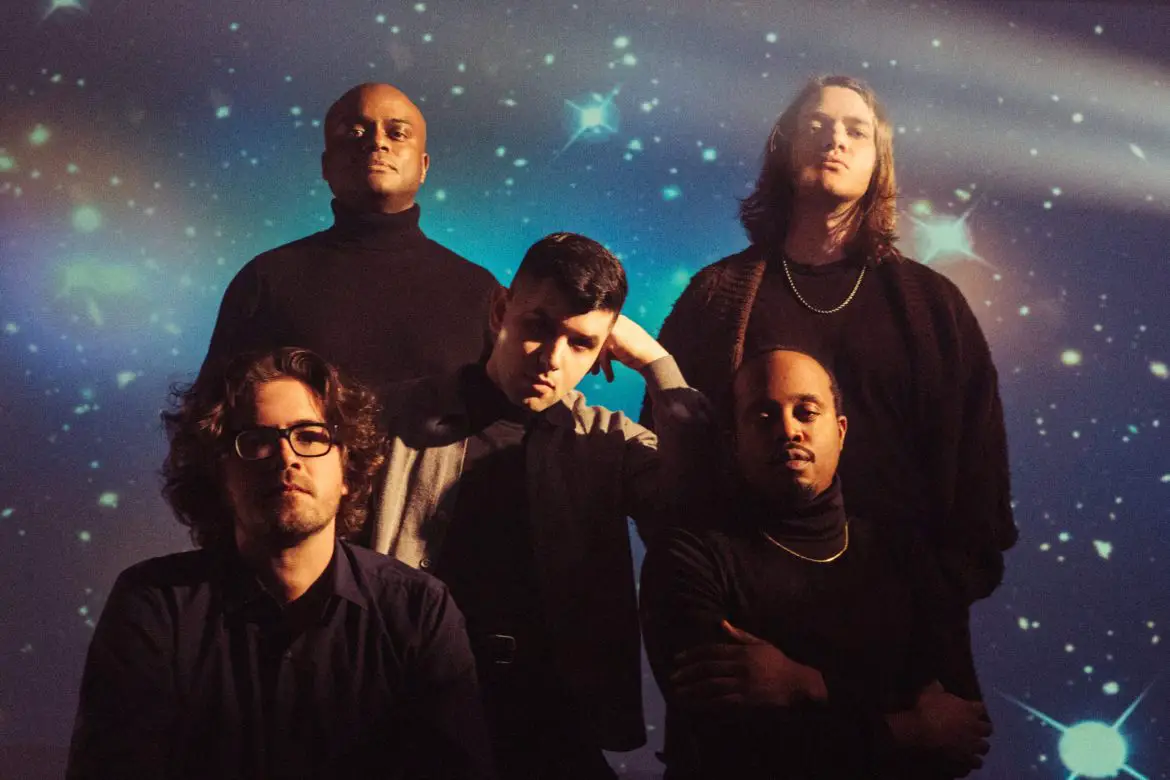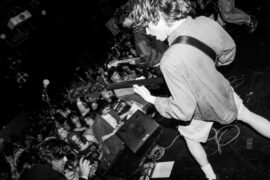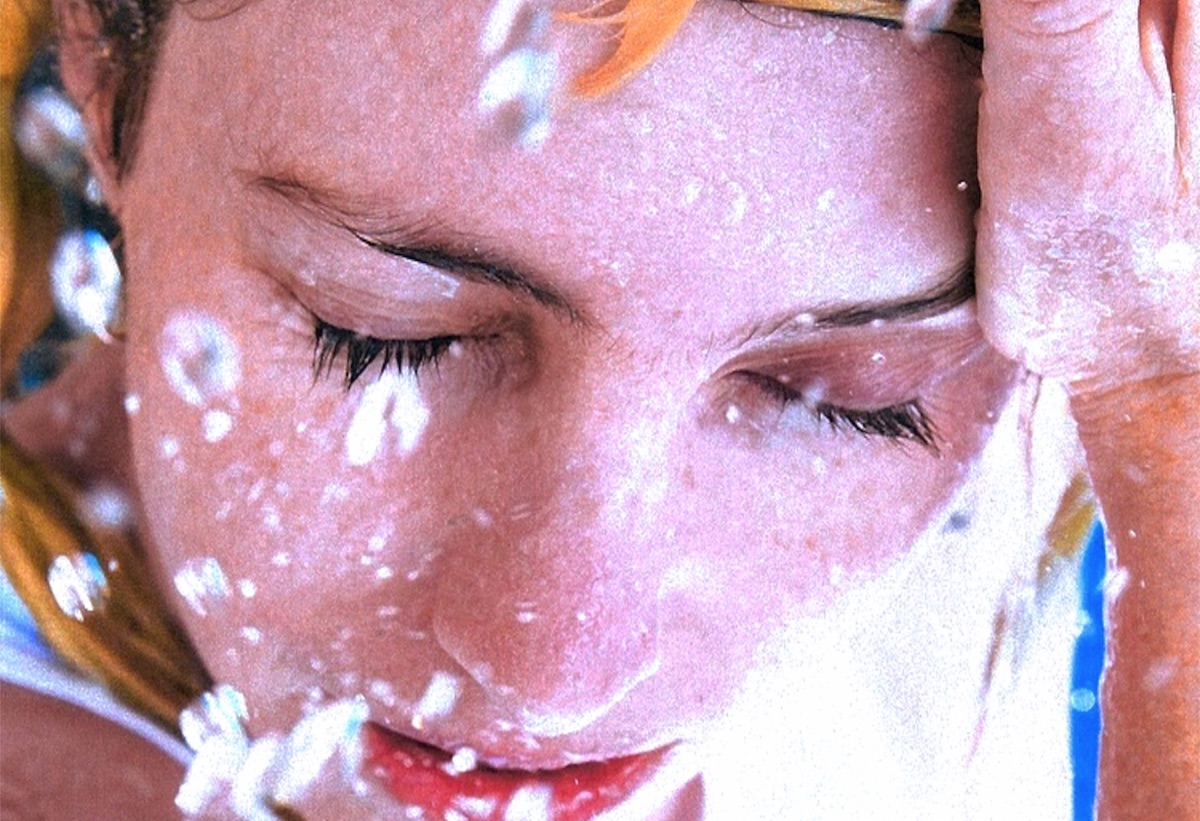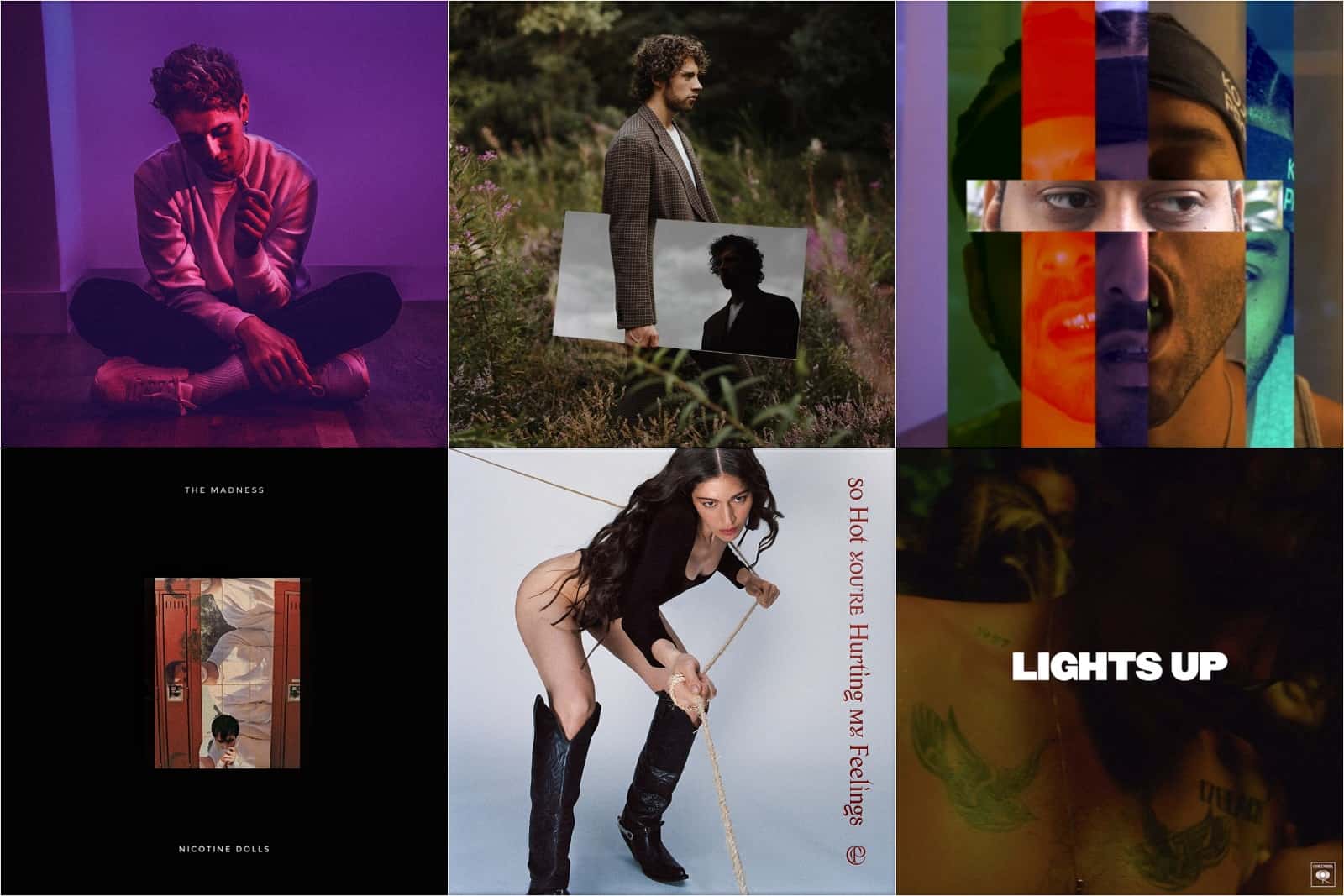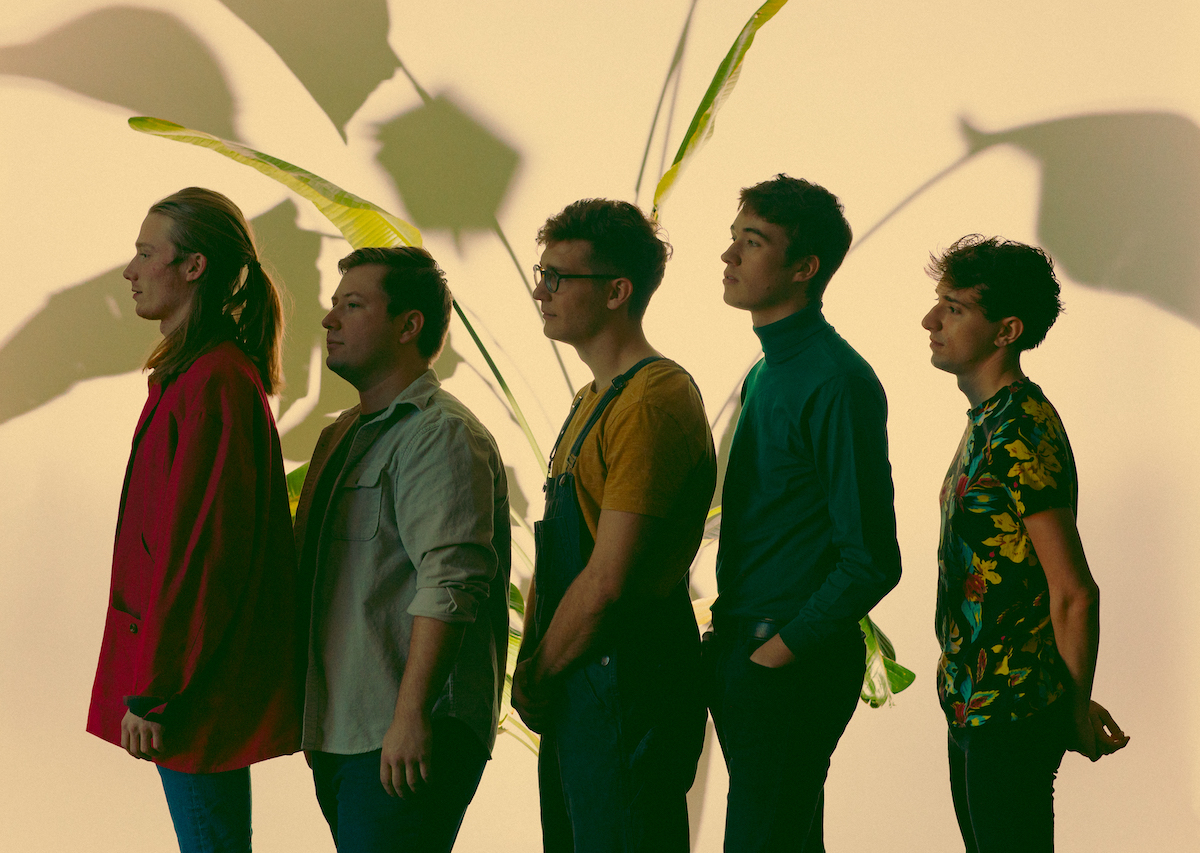The Indiana-bred soul revival band discusses their return to the stage after lockdown, getting back in touch with themselves during the pandemic, and the people and music that shaped their latest album.
‘Private Space’ – Durand Jones & The Indications
The road from college basement jam sessions to selling out iconic venues across the country wasn’t easy for Durand Jones, Blake Rhein, Aaron Frazer, and their bandmates. Five years after releasing their self-titled debut, The Indications are settling into a new life as full-time musicians, touring with indie rock icons My Morning Jacket and garnering warm reception for their third record.

Released July 30, 2021 via Dead Oceans, Private Space is a shiny, disco-inspired detour from the band’s usual ’60s-tinged sonic fare, but by no means is it a departure from their roots—simply a deepening in a new direction. At the core of these slick pop tracks is the desire to connect with others and share a collective, positive experience, which luckily happens to be the ensemble’s forté.
Ahead of their performance at Brooklyn Steel, Atwood Magazine caught up with Jones and Rhein via Zoom as they reflected on the past year-plus of the pandemic and their careers.
— —
:: stream/purchase Private Space here ::
A CONVERSATION WITH DURAND JONES & THE INDICATIONS

This interview has been edited for brevity and clarity.
Atwood Magazine: How has touring been so far, in terms of the pandemic?
Durand Jones: A friend of mine was saying that the world has gotten over COVID and in a way it does feels kinda like that. It’s weird that people are still dying from this and contracting this virus, and we’re out here playing. I feel blessed to be working, to be able to give the people the music, but it still feels like we’re in weird times.
How have you been otherwise?
Durand Jones: Beautiful! I’ve been talking to so many musicians and a lot of them feel the same way I did about having 2020 off, needing that time to breathe. Now when I’m on stage, I feel like a totally different person. I don’t feel like the same guy that was going on stage pre-pandemic. I feel totally different, and it’s great.
Different in what ways?
Durand Jones: I think I’m just in a better place mentally, physically, and spiritually. I got to have the time to assess my experiences on the road during quarantine, and through that, I found my worth. I realized what I’m worth. You know what I’m saying? Like there were some times where I would be at a fancy dinner or be around these amazingly successful and beautiful people and feel like an imposter. And like, ‘I don’t deserve to be here. I only got $2 in my bank. What the hell am I doing at this place?’ You know, just feeling that. And I was able to think about those instances during quarantine and tell myself, ‘You deserve to be in these places, you deserve to be around these people. You’re worth it.’ Telling myself that and getting to that point of self-love was incredible for me. It really did me good.
Amazing. And where were your heads at when you guys were starting to make Private Space?
Blake Rhein: We wrote the songs that ended up on the album right at the beginning of 2020, before coronavirus [shut the US down]. We wrote the song “Private Space,” “Reach Out,” and “Sea of Love” at Colemine Records; they have a studio above their store. So we went there New Year’s Eve 2020, and then we recorded a bunch. We’ve gotten a few questions about, ‘How did you arrive at the sound that you did for this record?’ And it felt fairly intuitive, just part of the process of how we always worked on music together. Just sitting down, playing songs for each other or texting Spotify links to each other, and being like, ‘Yo, check this song out. We should do something this.’ So it wasn’t like, ‘Let’s do disco,’ it’s, ‘Hey, we’re all into this thing now, let’s give it a shot.’ And then from there, you learn the production. There’s a learning curve, like, ‘Okay, how do we achieve that sound?’ which is a very similar process as for the first record. That was like, ‘We want to make like a ‘60s sounding sort of record. How do we do that?’ So this time around we were going through this reverse engineering, essentially. So this record, I think more so than American Love Call, was really similar to working on the first one.
Durand Jones: You know, the songwriting process with these fellows has felt very authentic. It just feels really organic. What works, works; it flows really easily, so there wasn’t much of a challenge avoiding clichés or trying to reinvent the wheel, per sé. We were writing stuff that we felt good about, and if it didn’t feel good, it just didn’t live that long.

How did your dynamics as a band shift during the pandemic, if at all?
Blake Rhein: At the end of 2019, we started to really see this as a viable, long-term career, so with that comes other pressures. I think sometimes unconsciously, we would take that out on each other. Getting to a point where we’re feeling more comfortable with where this band is at, like in a long-term capacity, has made me so grateful for Aaron and Durand in my life. I can put the petty to the side, ‘cause this is family now. How grateful I am to be here outweighs any of the negative feelings I ever had. It was really, really hard for years financially, but also physical exhaustion, mental exhaustion, and emotional exhaustion really took a toll on all of us.
I found this record to be more of a hopeful, feel-good album than American Love Call was. What made you decide to take that shift in direction?
Blake Rhein: I think that was just us challenging ourselves a little bit. In my listening, I gravitate towards not necessarily sad—I would describe it as moody music, like minor keys. I think writing songs with an upbeat, happy mood can be tough, like really cheesy sometimes, so I think it’s challenging. I think there’s a lot of happy songs that are really successful and that I really enjoy. But then again, for instance, “Witchoo,” it is very feel-good party song, but the entire song is based on a big, minor ninefold. So the music does actually kind of have that moody feel that we talked about, but the lyrics and some of the other production elements definitely give it more of a party feeling.
Who were you looking towards and enjoying while you were working on Private Space?
Blake Rhein: One of the things that I’ve found is that my listening habits have changed since the first record. Because we’re out here touring and releasing records, I feel a bigger connection with contemporary music. I’m following artists who are putting out records and listening to their music, but also following their career, what they’re doing aesthetically and what they’re doing with videos and stuff. That’s just so fun to watch. Like when you discover a new artist who’s just starting out and then you just watch them grow and grow—like Steve Lacy, he plays guitar in the band The Internet. I love his work. I think he like threatens the line between modern or contemporary and retro pop and lo-fi. And another Los Angeles-based artist, Joyce Rice, she sings ‘90s or maybe even early 2000s-style R&B, but there’s also some ‘70s influences in there just because soul influenced ‘90s R&B and she’s drawing from that. And then there’s one more band, Cruza. I discovered them in the middle of the pandemic and now they’re getting a record deal and touring. I’ve been having a really fun time following them. I definitely have been very motivated to find new music that I like, ‘cause there’s so much out there. 60,000 songs are put onto Spotify every day.
Durand Jones: Wow. I didn’t know that.
What are your personal histories with soul, funk, and R&B, or just music in general?
Blake Rhein: One of my earliest memories is my dad playing this song called “Devotion” by Earth, Wind and Fire. Our song “Reach Out” is reminiscent of it. But I just remember being like three or four years old, riding in my dad’s truck with him, and that song comes on the radio. We lived out in the country, like rural, so there weren’t many cars on the road, and he would start swerving and driving crazy when that song would come on. And it was always a joy to see him happy and expressive because he’s one of them country, Southern dudes; he’s a brick wall, it’s hard to get him to say a simple thing like ‘I love you.’ So seeing him emote like that, I look back and it gives me a kick.
Durand Jones: Music was just a part of my life. I had moments like that listening to Ray Charles and Nat King Cole in my grandmother’s car with her, and moments now where songs that I really loved as a kid, I’ll notice my nieces and my godchildren singing and enjoying at cookouts, which feels so familiar to me. I always had a special connection with music. I always knew I wanted to be a musician in some way, in some capacity. And my grandmother was definitely a person who pushed me to pursue the saxophone and encouraged me to continue with music after high school.
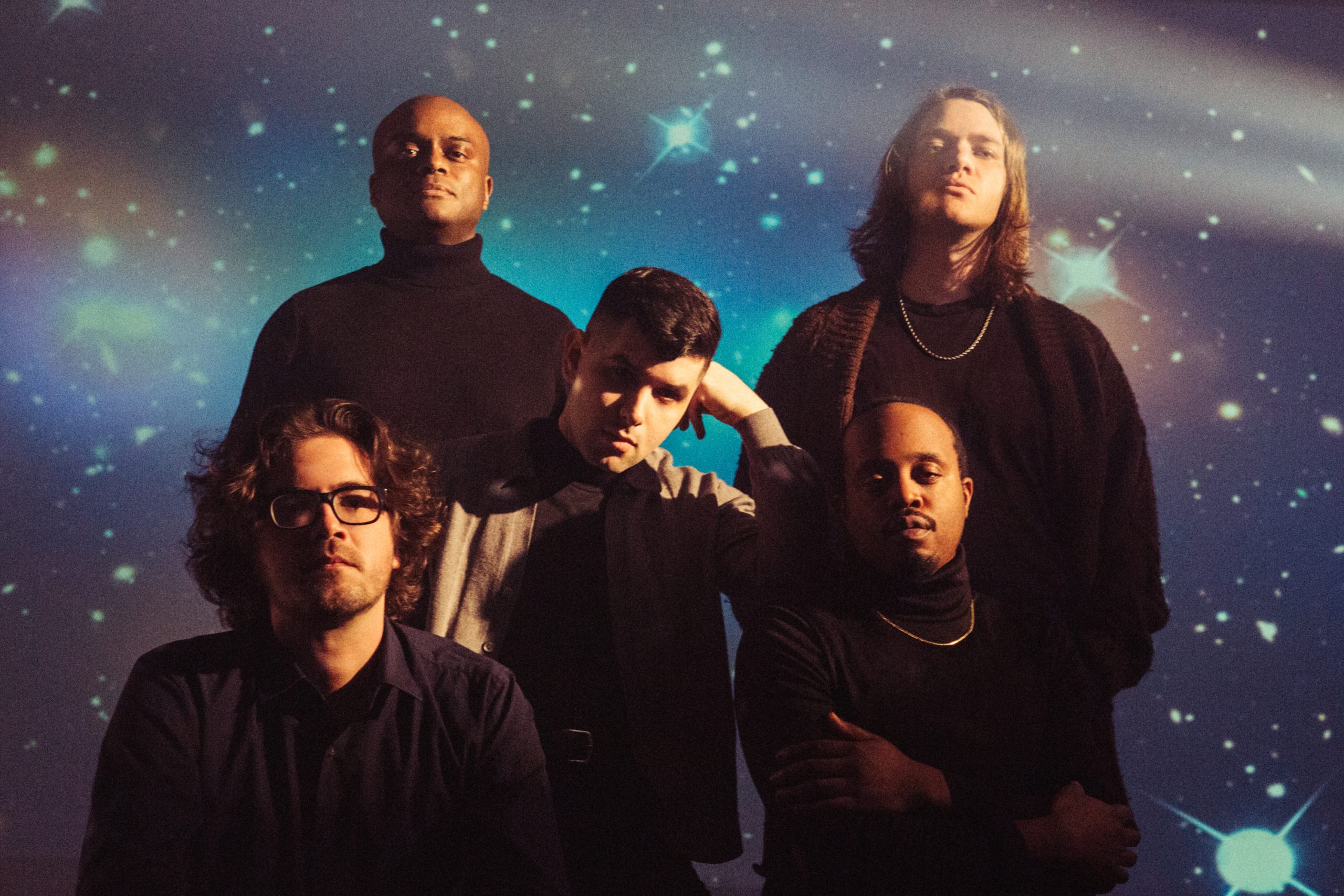
Durand, in previous interviews you’ve said that you want people to be able to find escapism when they listen to your music. What kind of escapism did you find while making and recording this record?
Durand Jones: When we were all in our separate places during 2020, I realized how much a safe space meant to me—having a place where I could be all of myself. For me, one of those spots was my grandmother’s porch. I found that place very comfortable, and it was very easy for me to be open and receptive to melodies and words and lines and all these different things. I would have a little salt rock lamp and my incense I’d have some green to smoke, as well as probably a little glass of tequila or something, and I’d be writing or trying to vibe and figure out a tune. I’d forget where I was altogether, and I think it was because that space I felt safe in allowed me to transcend where I was in that moment. And that was really cool for writing, and for me. I saw this poet do some spoken word thing, and she was saying something along the lines of, ‘Sometimes I laugh and forget what century I’m even in.’ And that’s what I wanted people to feel with this record—you close your eyes and you can be in a totally different place every time. You can be in the future—who knows? I just wanted that feeling to happen—that whole, ‘I can laugh and forget what century I’m in’—because it just feels so familiar to me, and I want other people to feel that way, too.
Do you experience it when you're performing, too?
Durand Jones: Oh, yes. I know when I have a good performance—it’s the ones that I barely remember. I don’t know why that is. When you’re in the moment, you’re not thinking about much. You get on stage and you’re just like, ‘wow, what happened?’ you know?
What kind of catharsis have you found as you've tried to keep your spirits up in these times?
Blake Rhein: When we were starting to release the singles, it was around the time that everyone was [starting to get] and I was really looking forward to it. It felt like it was gonna be this time where everyone’s coming together and it’s going to be this really beautiful moment. Unfortunately, it’s just not quite there. But at our Boston show, I looked out at the crowd and I saw so many different types of people. White, Black, Mexican, old, young—all types of people. That’s one of the things about this band that I’ve always really enjoyed, and that has motivated me so much. How we bring together all these people. Our demographic is so wide. It felt really good to see everyone together after being separated for so long. Despite where we are with COVID and Delta and all that, it feels right.
Yeah. It's like a reminder that we haven't totally lost each other as humans.
— —
— — — —

Connect to Durand Jones & The Indications on
Facebook, Twitter, Instagram
Discover new music on Atwood Magazine
? © Ebru Yildiz
:: Stream Durand Jones & The Indications ::

